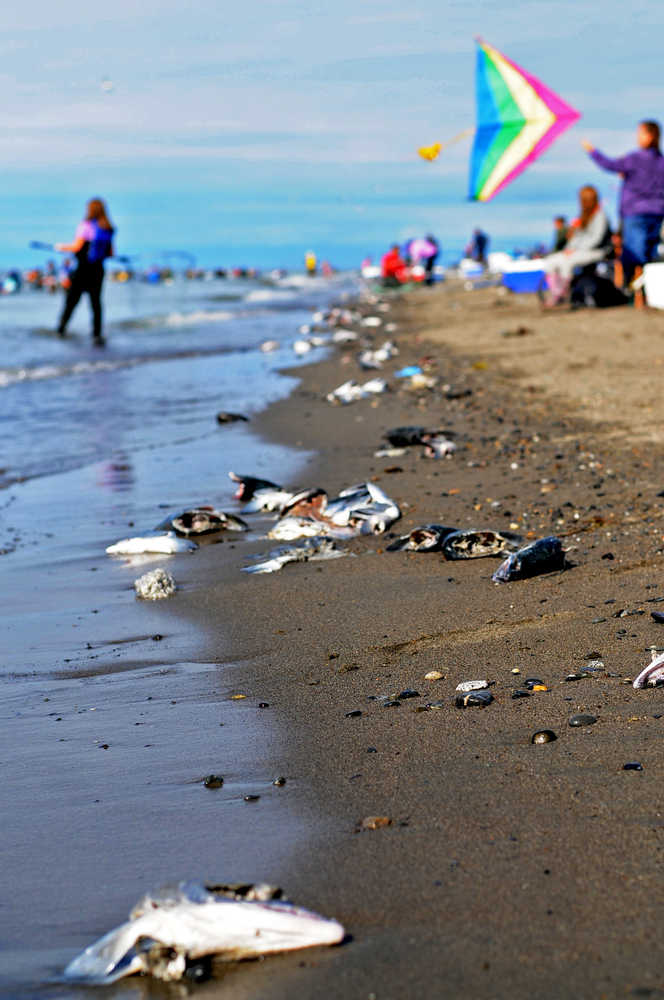At any given point, there are several lines drawn across the Kenai beach — the drag poles of dipnets, footprints on their way to the water and the cast-off heads and carcasses of dead fish.
From July 10–31, when the Kenai River’s beaches are crowded with Alaskans participating in the personal-use dipnet fishery, fish waste accumulates along the tideline. Dipnetters cleaning their fish will toss the heads to the seagulls, which often don’t get picked up; others will throw them into the water, but they frequently wind up right back where they started.
The fish waste causes considerable angst among Kenai locals. In response, the city of Kenai implemented policies in 2013 to fine improper disposal of fish waste and rakes the waste out every night into the water. Alaska Waste picks up dumpsters at the fishery every day, and local groups patrol the beaches to help pick up trash and educate fishermen on how to best keep the beaches clean.
Generally, the cleanup efforts have gone smoothly this year, said Bob Frates, the Parks and Recreation director for the city. The shift to a 24/7 fishery opening has made it more difficult for the staff to clean up because more people are on the beach at all hours, he said.
The city prefers people throw the fish waste into the water, but it can depend on the tide and wind conditions — during high tide cycles and when the wind is strong, that fish waste can wash right back and even wind up far from the tide line where it is hard for the city’s trucks to get it, Frates said.
“Once the fishery went 24/7, that kind of hampers our ability to do the fine-tuning that we’d like to do just because there’s so many people left on the beaches at odd hours of the night,” Frates said. “Any amount of wind coupled with high tides can be a challenge too, just because it drives the fish waste so far up the beach. We want to stay clear of the tents where people are and whatnot.”
On the beaches, fish waste can potentially cause bacterial contamination in the water due to birds eating the waste and disposing of it themselves later in the water in the form of guano. Fecal coliform is not necessarily directly dangerous to humans, but it can bring other pathogens with it that are. When matter containing fecal coliform decomposes, it can reduce dissolved oxygen in water, posing a risk to fish, according to research by the U.S. Geological Survey.
Plus, it can attract bears in other areas. The Alaska Department of Fish and Game issued a news release July 18 reminding dipnetters and anglers to properly dispose of fish waste because discarding it on public or private property or along roads, pull-offs and trails can attract bears into more populated areas. Illegal fish waste disposal can also carry a fine of between $300 and $1,000.
Dropping off fish waste in another water body is a no-go either — any pathogens or parasites a fish may have carried could infect another water body, posing a risk to the fish already living there, according to the news release. Anglers can take the fish carcasses to Central Peninsula Landfill outside Soldotna, where it’s free for private individuals to dump fish waste into a specific bin. Fish waste can also be deposited at the peninsula’s transfer facilities, but is limited to two double-bagged trash bags per day.
The Kenai Watershed Forum’s Stream Watch group regularly stages cleanups on parts of the river, picking up both trash and fish waste. The volunteers collect trash for disposal and educate anglers on how to best dispose of their waste and how to keep from degrading the riverbanks, said Melissa Steritz, the Stream Watch coordinator. This summer, the workers have spent a lot of time repairing bank-protecting fencing near the Moose Meadows that visitors have damaged, broken or cut, she said.
The volunteers advocate for anglers to cut up the fish carcasses into at least six pieces and get them into the fast-moving parts of the stream, Steritz said.
“We try to get them to cut it into as many pieces as possible. Ideally, six pieces or more is great.”
The Stream Watch program has hosted several cleanups on the beaches of the Kasilof River, which also hosts a dipnet fishery from June 25 until Aug. 7 and does not have the infrastructure of parking lots and dumpsters. As the fishery picks up, so does the trash lost on the beach; the Stream Watch volunteers have picked up 250 pounds of trash this week alone, she said.
The Kenai Watershed Forum will host a community cleanup on the north beach of the Kasilof River on Wednesday, Aug. 10, starting at 10 a.m., following by an evening cleanup on the south beach of the Kasilof River at 5 p.m. to include those with day jobs. Those interested should RSVP to Steritz 907-398-4304.
Reach Elizabeth Earl at elizabeth.earl@peninsulaclarion.com.

